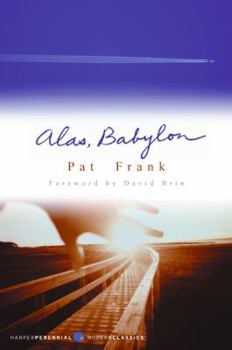Alas, Babylon
Select Format
Select Condition 
Book Overview
"An extraordinary real picture of human beings numbed by catastrophe but still driven by the unconquerable determination of living creatures to keep on being alive." --The New Yorker
The classic apocalyptic novel by Pat Frank, first published in 1959 at the height of the Cold War, with an introduction by award-winning science fiction writer and scientist David Brin.
"Alas, Babylon." Those fateful words heralded the end. When the unthinkable nightmare of nuclear holocaust ravaged the United States, it was instant death for tens of millions of people; for survivors, it was a nightmare of hunger, sickness, and brutality. Overnight, a thousand years of civilization were stripped away.
But for one small Florida town, miraculously spared against all the odds, the struggle was only just beginning, as the isolated survivors--men and women of all ages and races--found the courage to come together and confront the harrowing darkness.
Related Subjects
Classics Contemporary Fiction Literature & Fiction Science Fiction Science Fiction & Fantasy





